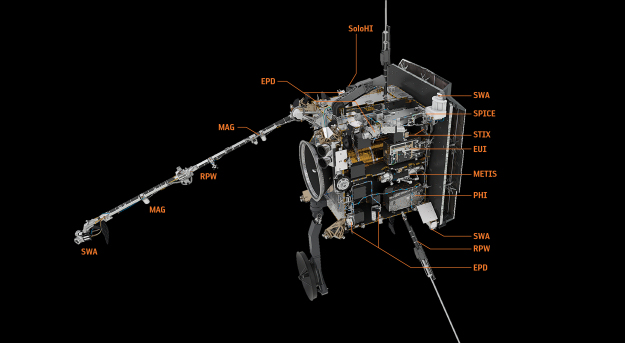Solar Orbiter, a mission with IEEC contribution

On 10 February 2020, ESA’s Solar Orbiter mission successfully lifted off on an Atlas V 411 from Cape Canaveral, Florida, at 05:03 CET on its mission to study the Sun from new perspectives.
The Solar Orbiter mission will study the Sun in detail thanks to a suite of scientific instruments and an ideal orbit around it. The probe will approach the Sun up to a distance of 42 million kilometres, meaning that the isolated parts of the probe will be exposed to temperatures over 500ºC, while the parts remaining in the shadow will be at around -180ºC. During this mission, the orbit will increase its inclination towards the ecliptic up to 30 degrees, which will make it possible for researchers to obtain high resolution images of the solar poles.
A team from the Institute of Space Studies of Catalonia (IEEC — Institut d’Estudis Espacials de Catalunya) at the Institute of Cosmos Sciences of the University of Barcelona (ICC, UB) has worked on one of the ten instruments of the Solar Orbiter, which is called SO/PHI (Polarimetric and Helioseismic Imager). SO/PHI will provide high precision measures of the magnetic field of the solar photosphere.
The IEEC-ICC team took care of the development and implementation of an Image Stabilization System (ISS), which will enable the balance of the probe movements to acquire images of high quality. “Solar Orbiter is the most complete solar mission from an instrumental point of view”, notes Josep M. Gómez Cama, IEEC-ICC researcher and member of the Department of Electronical and Biomedical Engineering of the UB. Specifically, the probe has ten instruments weighing a total of 209 kilograms. “Weight limitation is a challenge when designing the PHI instrument, which has a mass of about 30 kg”, notes Gómez Cama. Four of these instruments, which allow the detection of the solar wind (plasma and magnetic field), radiation and emitted particles, work in situ, while the other six do it remotely and allow imaging at different wavelengths and spectroscopy of the solar photosphere and the corona.
A step forward in space meteorology
Moreover, the researchers from the Heliospheric Physics and Space Weather Group (HPSWG) of IEEC-ICC provided scientific support to the team of the Energetic Particle Detector (EPD) instrument. The members of HPSWG, experts in data analysis and modelling of solar particles, developed models to predict the environment of particle radiation Solar Orbiter will find and are working on tools to facilitate the analysis of the particles it will detect.
The Solar Orbiter probe will enable the fixed monitoring of a specific area of the Sun as well as the planning of specific campaigns remotely. According to Àngels Aran, IEEC-ICC researcher from the HPSWG group, “the results obtained by Solar Orbiter will help us to understand the physics that connects the star with the interplanetary environment and therefore provide constraints to the current space weather models”. “Also – she adds –, the combination of Solar Orbiter observations with data from other probes in the interplanetary space, and in terrestrial environment, will provide us with a complementary view of the same phenomena”.
Links
– IEEC
– ICC
– HPSWG
– Solar Orbiter mission webpage
More information
The Institute of Space Studies of Catalonia (IEEC — Institut d’Estudis Espacials de Catalunya) promotes and coordinates space research and technology development in Catalonia for the benefit of society. IEEC fosters collaborations both locally and worldwide and is an efficient agent of knowledge, innovation and technology transfer. As a result of over 20 years of high-quality research, done in collaboration with major international organisations, IEEC ranks among the best international research centers, focusing on areas such as: astrophysics, cosmology, planetary science, and Earth Observation. IEEC’s engineering division develops instrumentation for ground- and space-based projects, and has extensive experience in working with private or public organisations from the aerospace and other innovation sectors.
IEEC is a private non-profit foundation, governed by a Board of Trustees composed of Generalitat de Catalunya and four other institutions that each have a research unit, which together constitute the core of IEEC R&D activity: the University of Barcelona (UB) with the research unit ICCUB — Institute of Cosmos Sciences; the Autonomous University of Barcelona (UAB) with the research unit CERES — Center of Space Studies and Research; the Polytechnic University of Catalonia (UPC) with the research unit CTE — Research Group in Space Sciences and Technologies; the Spanish Research Council (CSIC) with the research unit ICE — Institute of Space Sciences. IEEC is integrated in the CERCA network (Centres de Recerca de Catalunya).
Image
PR_Image1: Solar Orbiter satellite
Caption: Artistic recreation of the Solar Orbiter satellite.
Credit: ESA/ATG Medialab.
Contacts
IEEC Communication Office
Barcelona, Spain
Rosa Rodríguez Gasén
E-mail: comunicacio@ieec.cat
Institute of Cosmos Science (ICC, UB)
Institute of Space Studies of Catalonia
Barcelona, Spain
Àngels Aran
Researcher
E-mail: aran@ieec.cat, aaran@icc.ub.edu
